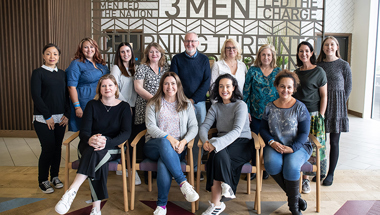Talking about dying
Talking about approaching the end of your life and dying can help you process what is happening and feel less alone. It can also help your family and friends prepare themselves. But knowing how to tell people that your treatment isn’t working or that you’re dying can be difficult. You might worry about how they’ll react and if you’ll upset them.
Some men feel that they can cope on their own and don’t want to talk. Your family and friends might find this hard to accept. There’s no right or wrong way to talk about dying. How you talk about it will depend on your situation and your relationship with the person you’re talking to.
Take time to think about the best way to talk to your family and friends.
You may want to:
- think about the time and place where you want to talk. It can help to be in a calm environment. If you’re able to walk around, some people find that talking while you’re going for a walk can make the conversation less confrontational.
- try to make sure you both have enough time to say the things you want to say and listen to each other.
Remember that the person you are talking to may have similar questions and worries to you. They may find it a relief to be able to talk about their thoughts and feelings. It’s important to listen to them too – understanding what they are thinking can help.
How to start a conversation
You could prepare the other person for the conversation by letting them know you want to talk about something serious. For example, you could say, “I want to talk to you about something that might be difficult” or “Can we talk about my prostate cancer?”.
You might want to share what you’ve been thinking and see how the other person responds. For example, you could say, “I’m worried about what will happen in the future”, “I’ve been thinking about what might happen if I get seriously ill” or “I’m worried about how long I have left to live”.
If you’re not sure whether the other person wants to talk about something, you could ask them. For example, you could say, “I’ve been thinking about where I’d like to be cared for if I become really unwell. Can I talk about it with you?”
The other person might not know how to respond straight away. So it can help to give them time to think about having a conversation. For example, you could say, “At some point, I’d like to go through my Will so that you know what I’d like to happen after I die. Can we talk about it sometime?”
You could let the other person know that they can ask you about things in the future, so that you keep communicating about things. For example, you could say, “You can talk to me if you have questions or worries about things” or “I know that some things are difficult to talk about, like what will happen if I get more ill or after I die. But it’s okay to talk about these things with me if you want to.”
If you need support to have these conversations, ask your doctor or nurse for advice. Find out more about talking about dying from Dying Matters
Talking to children and grandchildren
Children can often sense that something is wrong even if they don’t understand it. It can be difficult to know what to say to them and if they’ll understand.
What can help?
It is usually best to be honest with your children or grandchildren. Keeping things from them might only make them worry more.
These organisations have information that might help:
- Macmillan Cancer Support- how to talk to children about cancer.
- Winston's Wish- support for talking to children about death and dying.
- Maggie’s- tips on how to talk to children when someone close to them has cancer.
You can also ask your doctor, nurse or hospice for advice, or to refer you to someone who can help.
It can be difficult to cope with the fact that you are approaching the end of your life. Sometimes it can feel overwhelming. You don’t have to go through it alone.
Here are some ways to get more support:
- Talk to your doctor or nurse about the care and support that’s available to you and your family.
- Get more support using the Dying Matters directory of services.
- Download or order information you need from Marie Curie and Macmillan Cancer Support.
- Contact our Specialist Nurses.
- Visit our wellbeing hub for information on looking after your mental and emotional health.
Reviewers
Updated: August 2025 | Due for Review: August 2028
- Marguerite Bingle, Prostate Cancer Clinical Nurse Specialist, East Suffolk & North Essex NHS Foundation Trust
- Will Ince, Consultant Oncologist, Cambridge University Hospitals NHS Foundation Trust
- Nicola Lancaster, Macmillan Metastatic Uro-Oncology CNS, Dartford & Gravesham NHS Trust
- Our Specialist Nurses
- Our volunteers.


